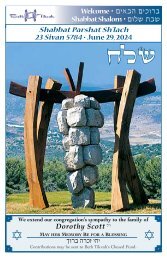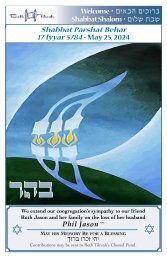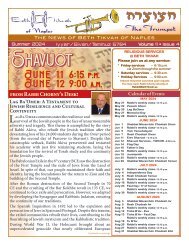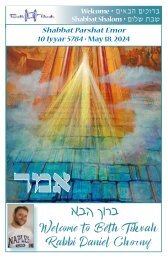You also want an ePaper? Increase the reach of your titles
YUMPU automatically turns print PDFs into web optimized ePapers that Google loves.
Welcome • ohtcv ohfurc<br />
Shabbat Shalom • ouka ,ca<br />
Shabbat Parshat <strong>Acharei</strong> <strong>Mot</strong><br />
26 Nisan 5784 • May 4, 2024<br />
`un hrvt
Yahrtzeiten<br />
Anniversaries<br />
May 9 Jay & Stuart Kaye (31)<br />
Speedy Recovery<br />
We extend our best wishes for a speedy recovery to<br />
Eisenhower Joseph and Joe Henson<br />
vfrck oburfz<br />
May 3 • 25 Nissan Fanny Freund – <strong>Mot</strong>her of Sidney Freund<br />
William Feldstein – Father of Gail Sherer<br />
May 5 • 27 Nissan Tzvi Menachem – Granadfather of Irwin Edelstein<br />
Cora Weil<br />
– <strong>Mot</strong>her-in-law of Harvey Rosenthal<br />
Chaim Kronenberg – Father of Rene Geist<br />
Horace Bier – Father of Bruce Bier<br />
May 6 • 28 Nissan Helen Silow – <strong>Mot</strong>her of Michael Silow<br />
Steven Bernard – Husband of Susan Bernard<br />
Raye Chizzik – Grandmother of Steven Chizzik<br />
May 7 • 29 Nissan Jack Rubenfeld – Father of Susan Bernard<br />
May 9 • 1 Iyyar Al Kagin – Father of Stan Kagin<br />
May 10 • 2 Iyyar Fannie Resnik – <strong>Mot</strong>her of Beverly Blazar<br />
Sol Kamin<br />
– Father of Fred Kamin<br />
Shabbat Kiddush Sponsored by:<br />
Angela & Harvey Jacobson<br />
In honor of their Anniversay<br />
Michael & Debra Silow<br />
k ” z<br />
In memory of Helen R. Silow<br />
Andy & Bevely Blazar<br />
In honor of the Congregation<br />
cuy kzn<br />
vnka vtupr<br />
Mavens: Rosalee Bogo & Steve Chizzik<br />
Assisted by: Arleen Sivakoff, Judy Levitt, Isabel Ramos,<br />
Shep Scheinberg<br />
Sponsor a<br />
Kiddush<br />
Contact Arleen Sivakoff:<br />
dsivakoff@aol.com • 239.455.8811
Torah & Haftarah Readings:<br />
Shabbat <strong>Acharei</strong> <strong>Mot</strong>: Leviticus 17:1–18:30 (Cycle 2) (Etz Hayim p. 685)<br />
1. 17:1-7 2. 17:8-12 3. 17:13-16 4. 18:1-5<br />
5. 18:6-21 6. 18:22-25 7. 18:26-30 M. 18:28-30 (p. 692)<br />
Haftarah: Amos 9:7-15 (p. 706)<br />
Torah Commentary<br />
D’var Torah:<br />
The Same is For Everybody - Bex Stern-Rosenblatt<br />
The language of sending a goat to Azazel is disturbing. We read of<br />
the ritual that there is one goral for God and one goral for Azazel.<br />
In Biblical Hebrew, goral means lot, as in “to cast lots.” The<br />
meaning is clear: one goat gets sacrificed to God and the other<br />
gets sent out of the camp. But the meaning of words is not fixed.<br />
Goral will come to mean fate, which would render our verse: one<br />
fate for God and one fate for Azazel.<br />
It is this meaning that the midrash in Vayikra Rabbah 20:1 will<br />
pick up on. It opens with the difficult verse from Ecclesiastes,<br />
questioning the purpose of doing anything in life when everyone<br />
dies. We read: “the same is for everybody. One fate for the<br />
righteous, and for the wicked; for the good and pure, and for the<br />
impure; for him who sacrifices, and for him who does not; for<br />
him who is pleasing, and for him who is displeasing; and for him<br />
who swears, and for him who shuns oaths.”<br />
In the context of the goat, it means sometimes it’s better not to be<br />
a goat. The goat sacrificed to God and the goat sent to Azazel both<br />
die. What does it matter when? What does it matter for what?<br />
What does it matter if one dies pure and one dies laden with sins<br />
of our entire community? In the end, they are both dead.<br />
Death hangs over our parashah. The ritual of the goats appears<br />
immediately after we are reminded of the deaths of Aaron’s sons,<br />
Nadav and Avihu. After their deaths, Aaron is commanded to<br />
go make meaning, to go make holiness, to separate, to judge, to<br />
live. But his sons are dead and either way, both goats will die. The<br />
same is for everybody. Why should Aaron bother with purity and<br />
sacrifices when such a route led to the death of his sons?
The verse is even stronger than that. We are invited to read not<br />
just Aaron’s sons in place of the goat, but God himself and Azazel.<br />
Why should God and Azazel share the same fate? Why should<br />
this Azazel get a goat just as God does?<br />
These questions are complicated by our lack of knowledge about<br />
what or who Azazel is. Perhaps it is a place name. Perhaps it means<br />
goat of removal (kzt + zg) Perhaps it means God’s rage/fierceness<br />
(kt + zzg) Or perhaps it is referring to Aziz, a contemporary deity,<br />
saying, Aziz is El (kt + zzg).<br />
Whatever Azazel is, Azazel shares a fate with God as surely as we<br />
all share a fate with each other. But despite all that, despite the<br />
death of his sons, despite Kohelet’s musings on meaninglessness,<br />
Aaron does what he is asked. Moses does what he is commanded.<br />
We continue to dance the dance of life despite the death that waits<br />
for all of us. We choose to seek righteousness and purity. When<br />
confronted with the similarity of an unknowable God and an<br />
inconceivable Azazel, we still choose God. We come back from<br />
the abyss and send a goat into it in our stead.<br />
Join<br />
✺<br />
Rabbi Chorny<br />
for his weekly discussion<br />
group, Tuesdays at<br />
12:15 p.m. via<br />
and IN Person<br />
Beth Tikvah of Naples<br />
1459 Pine Ridge Road<br />
Naples, FL 34109<br />
239 434-1818<br />
Visit us online at<br />
bethtikvahnaples.org<br />
or scan the QR code


















